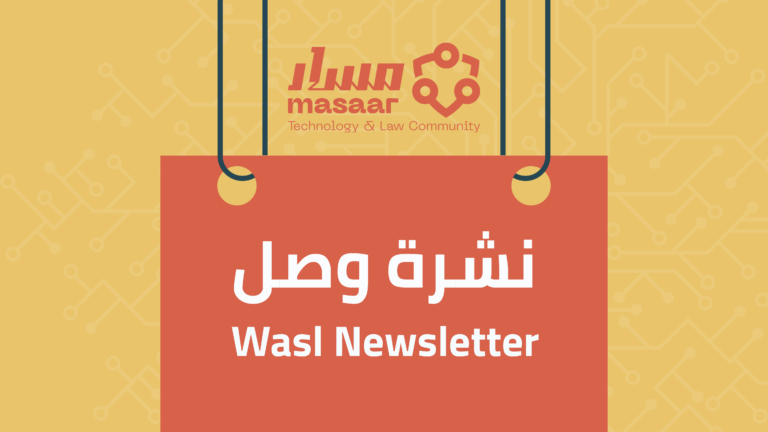
Stay Tuned: Registration for Bread&Net 2023 will open soon
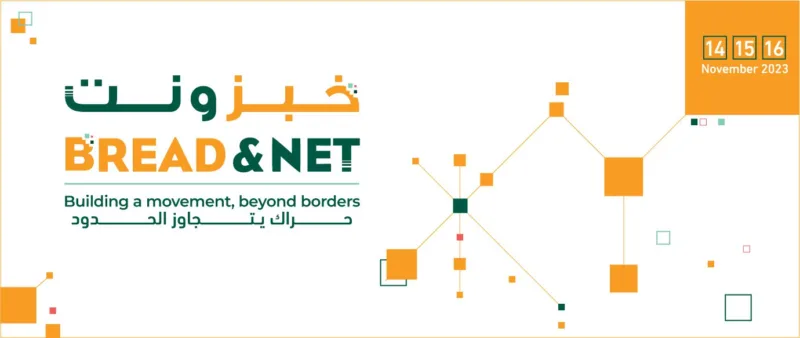
SMEX will host the sixth iteration of the annual regional digital rights event, Bread&Net, on November 14, 15, and 16 in Beirut, Lebanon.
Bread&Net is an event that brings together tech experts, activists, policymakers, academics, and media practitioners from the region to discuss and address pressing issues at the intersection of technology, society, and human rights. This gathering aims to foster the exchange of knowledge, research, and digital resources that would sustain civil society in its fight for safe, just, and inclusive digital spaces. Stay tuned for the program and registration.
Masaar’s ICT Laws Aggregator Updated with New Laws and Rulings
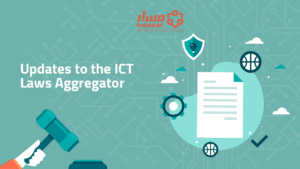
New laws, executive regulations, and rulings from the Economic Court have been added to ICT Laws Aggregator, bringing the total number of available laws to 17 and rulings to 52, classified into 5 main categories and over 80 subcategories. The ICT Laws Aggregator is a tool -available in Arabic only- that contains laws, regulations, and rulings related to the ICT sector and digital rights in Egypt.
Masaar’s Activities

Tech and Law
Amendments to the Telecommunications Law: New Restrictions on the Use and Operation of Telecommunications Equipment
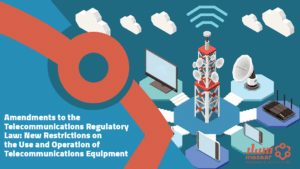
This paper deals with the 2014 proposal to amend the Egyptian Telecommunications Regulatory Law and then moves on to the content of the amendments that have already been approved and entered into force in 2022. These amendments include harsher penalties related to the import or manufacture of telecommunications equipment and the introduction of penalties for new criminalized forms. The paper also discusses the justifications of the Ministry of Communications and the Egyptian Parliament for approving the amendment of the law.
Link for the paper: In English | In Arabic
Data Protection Guide for Companies
This guide seeks to clarify the categories addressed by the Personal Data Protection Law and to explain the obligations that are imposed once the law is issued, and the technical responsibilities associated with the executive regulations of the law that have not yet been issued.
Link for the paper: In English | In Arabic
Issues of the Crime of Intentional Disturbance Using Telecommunication Means in Egypt
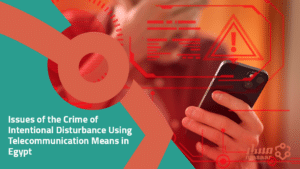
This paper aims to provide an explanation of the offense of “intentional disturbance and harassing through misusing telecommunication devices” by highlighting the legislative evolution of the concept of disturbance, starting from the Egyptian Penal Code and extending to the Cybercrime Law.
Link for the paper: In English | In Arabic
Legal Tech: Balancing Justice and Challenges
This paper examines the importance of legal tech today, its application in different countries, its negative impacts on justice, balancing positive and negative effects, and its impacts on rights and freedoms.
Link for the paper: In English | In Arabic
National Security and Harm to National Unity as Justifications for Tightening the Penalties for Cybercrime
This paper discusses the cases of punitive tightening in the Cybercrime Law. Article 34 of the law stipulates that all penalties stipulated in the law shall be aggravated to life imprisonment in the event that the crime is committed with the intention of harming national security or disrupting constitutional provisions, in addition to a number of other cases that have been expressed in undefined terms.
Link for the paper: In Arabic
Artificial Intelligence
Artificial Intelligence: Balancing Innovation and Human Rights
AI provides numerous benefits for human development, but can also be a source of potential risks. As AI becomes more powerful, it is important to consider the potential impact of AI on human rights.
Link for the paper: In English | In Arabic
AI Language Models: Threats and Safeguards

This paper provides an introduction that defines language models and highlights the key historical milestones in their development. It then presents the threats of language models through three main areas: discrimination and bias threats, privacy threats, and risks arising from inadequate model construction. The paper concludes by presenting the most important approaches to address these risks.
Link for the paper: In English | In Arabic
Deep Fake: A New Weapon Targeting Women
The term “deepfake” is a combination of two words: “Fake” which reflects that this type of content is not real, and “Deep” which reflects its penetration down to the smallest detail, which makes it more capable of deceiving the recipient than any previous technology. This paper covers how deepfake is used to target women, its impact on its victims, and ways to combat it.
Link for the paper: In English | In Arabic
Tech and Equality
Constructing Gender Identities Online
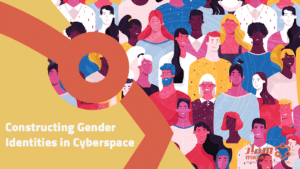
This paper depends on scientific evidence to argue that given that Cyberspace can be proven to be a social space, it can be safely assumed that it impacts the constitution of gender identities of people interacting with each other within it. The paper also examines different examples of gender-specific practices and presentations as they developed throughout the last three decades.
Link for the paper: In English | In Arabic
Impact of E-marketing Gender Policies on Shaping Gender Expressions on the Internet
This paper discusses the relationship of electronic marketing to the gender gap and gender discrimination against women. The paper presents the justifications for the great importance of e-marketing and its great role in shaping the image of the Internet and the experience of its users.
Link for the paper: In English | In Arabic
Health Technology and Women’s Right to Health Care

This paper aims to provide a comprehensive overview of the potential uses of information and communication technologies in delivering better healthcare services for women. It begins by briefly presenting the reasons why many women are deprived of adequate healthcare services. It then provides an overview of how information and communication technologies qualify to play a significant role in improving women’s opportunities to access suitable healthcare services that meet their diverse needs and ensure sufficient quality.
Link for the paper: In English | In Arabic
Crossing the Gender Gap in the Cybersecurity Industry
This paper argues that gender diversity in the cybersecurity industry, especially the inclusion of more women in its workforce, is necessary for its development to confront the growing cybersecurity threats effectively. The paper also highlights the importance of gender diversity in the cybersecurity industry and proceeds to discuss ways to address the gender gap in this industry.
Link for the paper: In English | In Arabic
Internet Governance
Internet Governance (4): Cybersecurity and Internet Governance
The fourth part of the “Internet Governance” series sought to provide starting points that highlight the great expansion of the Cybersecurity field, the threat of Internet Governance becoming swallowed into it, and the direct threats for Internet users due to incorporating it into the national security paradigms of nation-states.
Link for the paper: In English | In Arabic
Internet Governance (5): Human Rights and Internet Governance
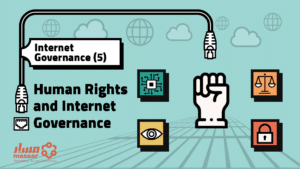
The fifth part of the “Internet Governance” series aims to provide an overview of how human rights are related to Internet Governance. It explores how the two major actors in the field of Internet Governance, nation-states and private sector companies, use the tools at their disposal to preserve their interests and maximize their gains, often at the expense of the human rights of their citizens and clients, respectively.
Link for the paper: In English | In Arabic
The Digital Services Act: Obligations and Impacts on Online Service Providers
This paper seeks to provide a comprehensive introduction as possible to the Digital Service Act, its road through a process that took 3.5 years till it finally got officially into force on November 16, 2022, its objectives, most important rules, obligations it sets for service providers, new mechanisms and bodies created for its implementation, and the new realities it is expected to create and their impacts on people living outside the EU.
Link for the paper: In English | In Arabic
Open Government: Empowering Society through Transparency and Participation
This paper seeks to provide a detailed definition of the concept of open government and the benefits that can be gained by society, its individuals, and its various institutions by its application, in addition to the obstacles that prevent this and the available ways to overcome them. The paper also deals with the Egyptian status quo and the obstacles to achieving the principle of open government in its context.
Link for the paper: In English | In Arabic
Quantum Computers: Ethical Dilemmas and Human Rights Challenges
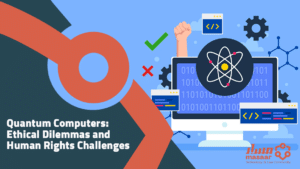
By exploring the evolving technological landscape, this paper seeks to elucidate the potential risks of quantum computing’s rise and underscore the paramount importance of maintaining a balance between technological advancement and preserving individual rights.
Link for the paper: In English | In Arabic
Privacy
From Virtual Threats to Real-Life Consequences: Understanding Electronic Extortion
This paper seeks to provide a comprehensive definition of the crime of electronic extortion and how it differs from the traditional crimes of extortion. It deals with the relationship between the crime of electronic extortion and both the right to privacy and the right to personal freedom. It also briefly presents a picture of the reality of the current legal approaches for dealing with this crime at the international and local levels. Finally, the paper reviews some ways to reduce the crime of electronic extortion.
Link for the paper: In English | In Arabic
Press Statements
Jordan’s new cybercrimes law will strongly undermine digital rights
A number of human rights organizations have expressed concern about the Jordanian Cybercrime Law, which was passed by the Jordanian Parliament and ratified by King Abdullah II. The statement indicated that the Cybercrime Law threatens digital rights, including freedom of expression and the right to information, and will ultimately fail in achieving the Jordanian government’s stated goals of tackling “disinformation” “hate speech,” and “online defamation.”
Link for the statement: In English | In Arabic
Joint statement: States must take immediate action to stop spyware threatening press freedom
Masaar, along with other civil society organizations and individuals, condemn the use of spyware against journalists and media workers – an alarming trend impacting freedom of the press and creating a wider chilling effect on civil society and civic space.
Link for the statement: In English
From the Arab Region
SMEX | Jordan’s Cybercrime Law to Limit Investments and E-Commerce
SMEX published an economic reading of the Jordanian cybercrime law, asking about the possibility of achieving any economic progress under a law that many see as restricting freedom of expression and a barrier to economic advancement plans.
Link: In English | In Arabic
7amleh | Procedural Guide to Palestinian Personal Data Protection in the Digital Space
7amleh published a guide for individuals, institutions, and the private sector in the State of Palestine to better protect the right to privacy in dealing with digital data based on Palestinian legislation and International Human Rights Law.
Link: In English | In Arabic
